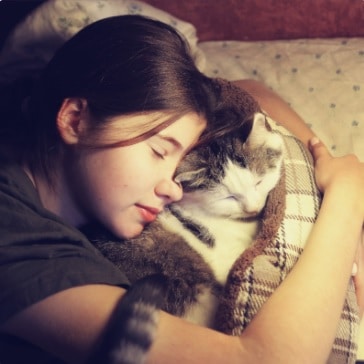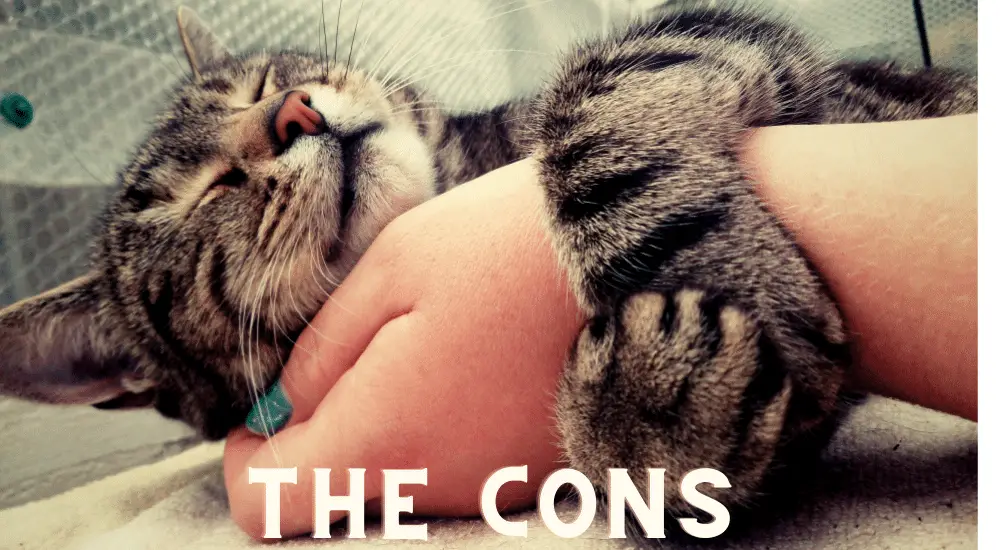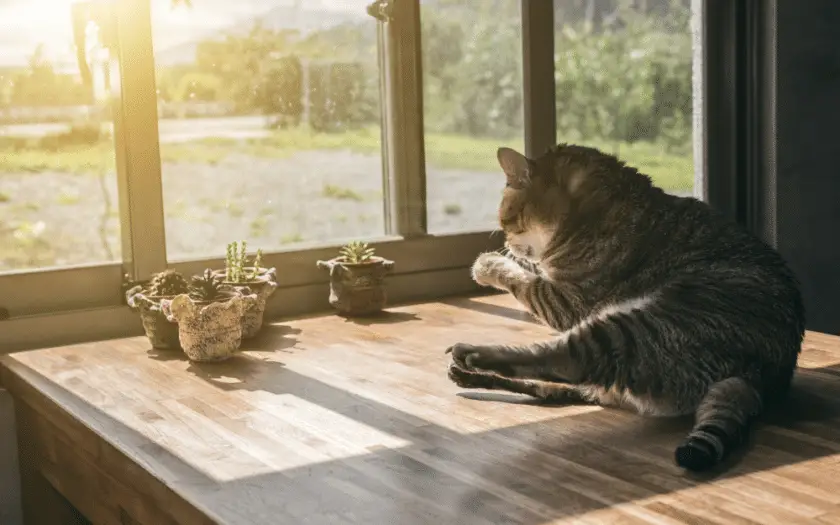Cats make fantastic pets. Their combination of semi-independence, intelligence, and snuggly-ness means that having a cat in your life can be less work than a dog, with the same benefit of companionship. Although they might seem like an easy pet, cats have some particular needs, which if not met can lead to an inharmonious life between them and their owners.
So how do you know if you can offer a suitable home to a cat? What if you live in a flat or apartment – is it fair to have an indoor-only cat? We’ve compiled a list of pros and cons of indoor cats to help you decide if a cat is right for you, your home, and your family.
Pros of keeping your cat indoors all the time
1. They won’t get hit by a car
It goes without saying that if your cat doesn’t go outside, they avoid the risk of any misadventures involving automobiles. Many cat lovers face an inner struggle before allowing their beloved cat outside to roam because of the niggling worry that they will end up injured or killed on the road.
2. They are less likely to get stolen
Pet theft is sadly on the rise, and microchips and attractive collars (with a safety release of course!) with identity tags will only reduce the risk to an extent. A cat that spends all their time indoors is very unlikely to get stolen unless you have some particularly shady or unwanted visitors to your home!
3. They are less likely to go missing
If your cat is indoor-only, you’ll hopefully miss out on that gut-wrenching feeling that sets in when they don’t return home. Just a few hours can feel devastating as you wonder what potential harm could have come to them.
Thankfully, often the worry is completely unfounded, and they return home unscathed and aloof, but sometimes you’re not so lucky. Unless you have an indoor-cat prone to jailbreak attempts you should be safe, as long as all family members remember to keep the outside doors shut!
4. They won’t bring in wildlife
Cats will often hunt birds, rodents, and other small wildlife, then bring them to you in an effort to provide for you or show off their catch. Whilst it’s upsetting when they bring in a dead animal, it’s in some ways worse when they bring in something alive, often in the middle of the night when you’re unaware and stalk it around the house for days.
These presents from your cat, although well-meaning, are one of the downsides of a cat that goes outdoors. If your cat is indoor-only, at least you won’t waste time moving furniture around and pondering why your cat has been looking at that bookcase so intently for hours!

5. You get to spend more time with them
While some cats enjoy a more solitary lifestyle, many cats will relish their time spent with you. Breeds like the Ragdoll and the British Shorthair can often be most content when curled next to you on the sofa or relaxing on your lap. This type of bonding between you and your cat will get the endorphins flowing and benefit both of you.
6. They are at less risk of getting unwell
Whilst having an indoor cat does not mean that they will be necessarily healthier than an outdoor cat, it does mean that they will be less exposed to diseases and infections, as well as parasites like fleas, ticks, and worms. Indoor cats will often need fewer wormers and fewer vaccinations, too!
7. You have more control over their diet
With an outdoor cat, it can sometimes seem that no matter how much you reduce their food, you get the same mildly concerned expression from your veterinarian as the number on the weighing scales rises visit after visit. If you’re genuinely offering the amount of food that would maintain a cat of half the size, it’s often the case that your beloved is having food elsewhere, from a kindly but unhelpful neighbor.
Having an indoor-only cat means that you won’t end up with a ‘Six Dinner Sid’. Don’t forget to read the cons list though, as there are plenty of reasons why an indoor-only cat may get a bit chubby!
8. There are fun ways that you can enrich their life
You may feel that having a cat who is kept indoors would be cruel and that they would be lonely and under-stimulated. However, there are many things that you and your cat companion can do to make their life more interesting and exciting. Puzzle feeders, a large variety of toys, and a self-contained outdoor area are all good options. Those who live in an apartment or flat with no outside space may even choose to use a lead and harness to take their cat outside to explore the world.

Cons of keeping your cat indoors all the time
1. You will need to provide and tend to litter trays
If your cat is indoor-only you will need to provide a place for them to relieve themselves. Cats are quite particular about where they go, so ensuring you have one litter tray per cat, plus one extra, and ensuring the litter trays are regularly cleaned, will help.
2. They might ruin your furniture
One of a cat’s normal behaviors is scratching. This is something they do to stretch, scent mark, and keep their claws maintained. An indoor-only cat should have access to multiple scratch areas including mats, posts, and cat trees. If you don’t provide these, they may target that antique wooden dresser or expensive Turkish rug!
-> Recommended: Discover what type of scratch tree cats love to use
3. They may keep you up at night
Cats don’t necessarily live to a schedule and are commonly more active at night. If you, and they, are confined together, you can likely expect some form of disruption to your sleep. If 3 AM zoomies don’t sound funny to you, you may need to rethink.
Additional reading: Do cats sleep at night?
4. They may show signs of stress
Some cats can cope with being indoor-only, but for others, it just doesn’t suit and leads to stress. If your cat is stressed you might notice them pulling their fur out, urinating in strange places, like the bathtub, or even see some blood in their urine. Of course, a stressed cat will also cause stress to its devoted cat parent.
5. They may gain weight
Because they are not going outside to roam, indoor cats are unlikely to burn as many calories as those that venture out. So, unless they are actively encouraged to move with toys, activities, and interaction, they can be prone to weight gain. Obesity is a risk factor for lots of diseases and should definitely be avoided!
6. They might be lonely
An indoor cat may feel lonely without enough social interaction, and although getting additional cats may help in some situations, cats are often solitary creatures — another cat isn’t necessarily the answer! Regular contact and interaction with you will help to reduce any loneliness if you keep your cat indoors.
7. They may try to escape
Some cats just don’t suit being indoor-only. After a period of settling in, you may still find they will take every opportunity to look for an escape route. This can be distressing for your cat and also for your family.
-> Tip: Don’t forget to pick up a collar for your cat. Wondering what to get? Breakaway collars are a better choice than regular ones.
8. They may not get the opportunity to act out their natural behaviors
Many people believe that having an indoor-only cat is cruel because they are unable to do the things which they would normally do – like hunting and playing. However, if you commit some time and effort to ensure your indoor cat has opportunities to display these behaviors artificially through various toys and activities, that is not the case.
9. You may not be able to leave them for long
Cats with free access outside via a cat flap, as well as access to a timed feeding device, and plenty of water may be able to be left alone for longer since they are able to toilet outside. On the other hand, a cat that is confined indoors should not be left for long.
Even with access to regular food and water, their litter trays will require emptying, and they will have no company or stimulation. So how long can you leave an indoor cat alone? Ideally no longer than 24 hours. If you’re going on holiday, consider getting an in-house catsitter. You can use a site like Jooble, which has many job boards. Such sites are great to find a suitable sitter.
So, is it OK to keep cats indoors?
Whilst there are lots of pros and cons of indoor cats, at the end of the day all cats are individual. Some breeds are better suited to being indoor-only cats, including Ragdolls, Siamese, and British Shorthairs, but even moggies can enjoy an indoor lifestyle.
As long as you provide toys, scratch posts, and adequate litter trays, as well as committing to spending time with your cat and ensuring they are active, cats can be happy indoors. However, if your cat shows signs of stress or unhappiness, or relentlessly tries to escape, it may be that your indoor-only home is not the best option for them.





